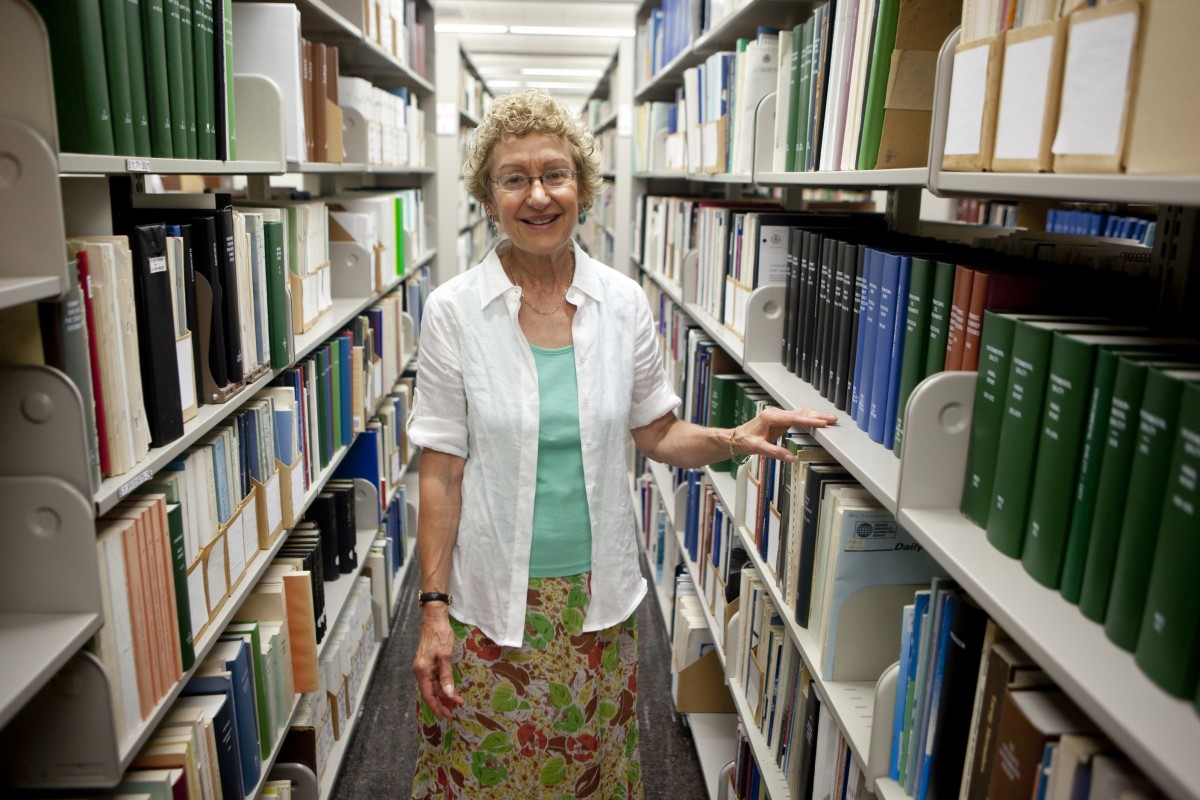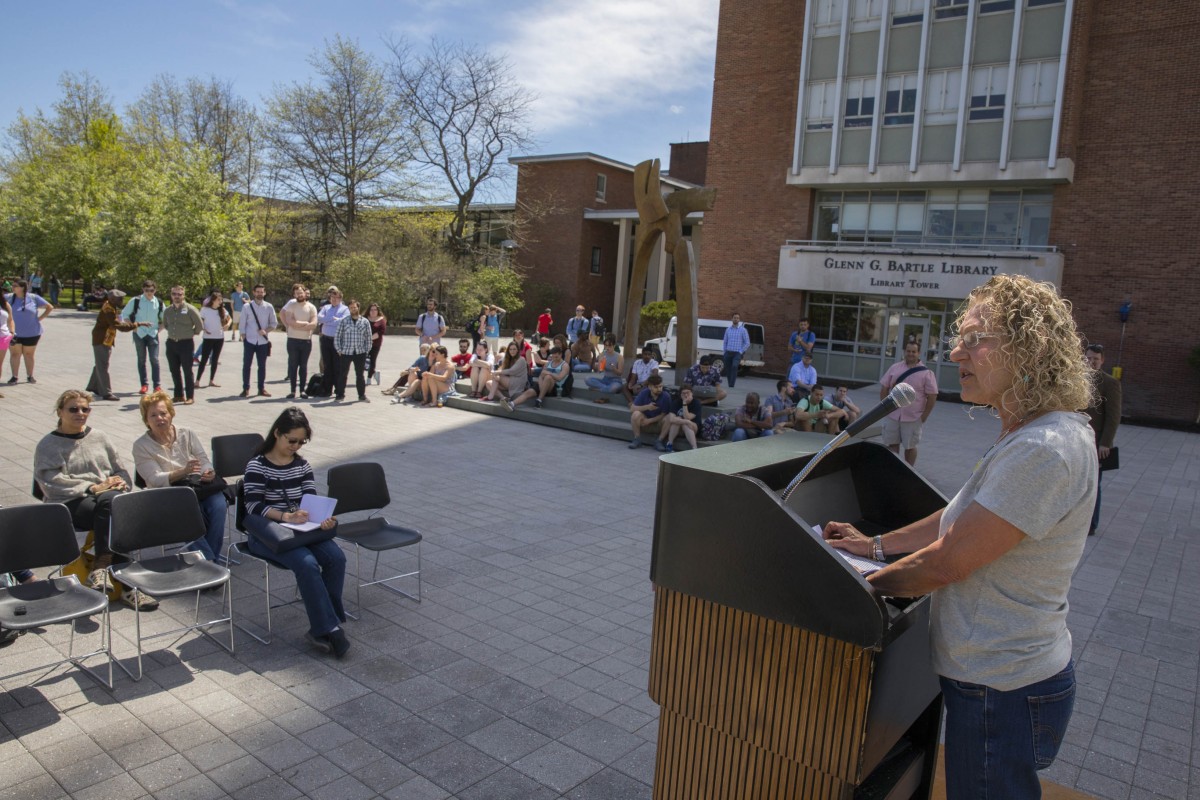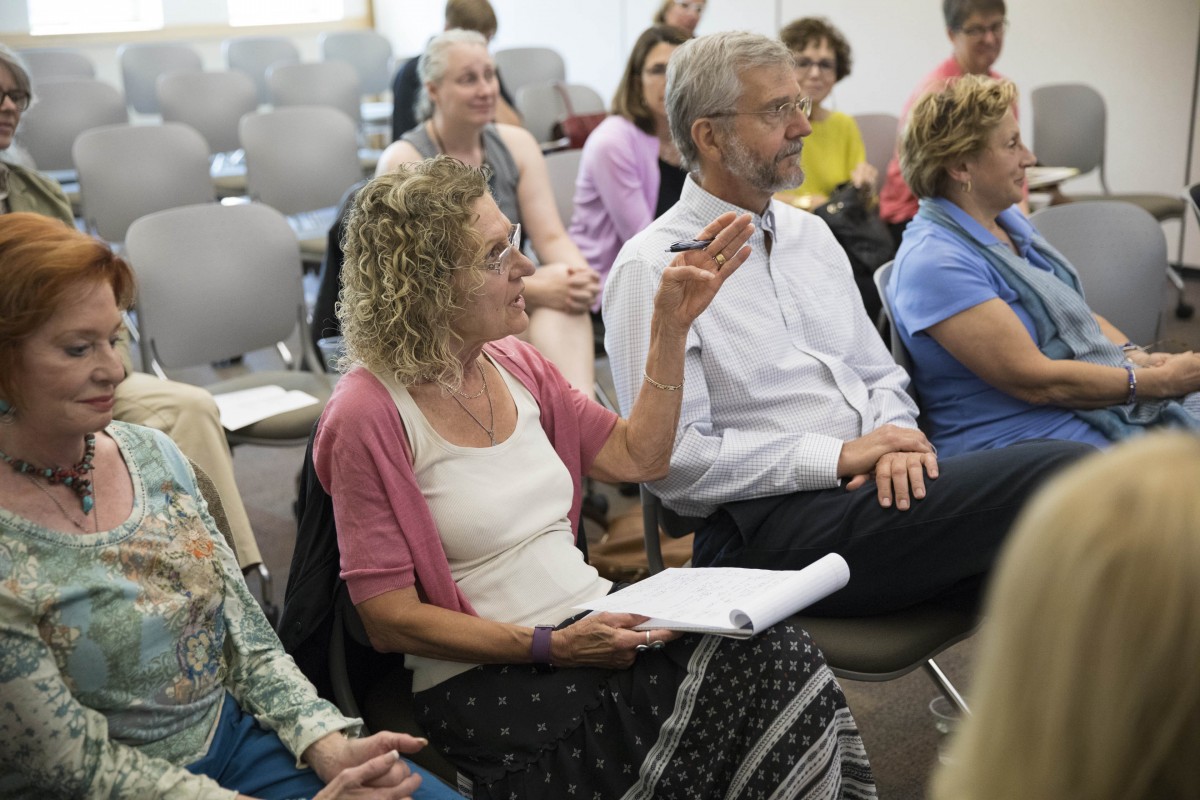The trailblazer: Jean Quataert transformed the field of history

In graduate school, budding scholars typically discover a topic that will stay with them for the rest of their academic lives. They first plumb its depths in their dissertation and, as their career evolves, take it to new frontiers with broader and more nuanced studies.
Yet they remain within familiar territory: the borders defined by their specialty, by particular time periods, by regions or methods.
Not so Jean Quataert.
The distinguished professor emerita of history helped lay the foundation for women’s history, recovering the role of women in German and European history. She began this work in the early 1970s, when the discipline was dominated by men and women’s issues weren’t considered significant, noted History Professor Donald Nieman, Binghamton University’s provost and executive vice president for academic affairs.
Then, she branched out to global history and human rights, an evolution reflected in her passionate commitment to politics and activism. Along the way, she helped create a new approach that looks beyond the borders of the national state to focus on the transnational movements of people, ideas and policies, said Binghamton University History Professor Leigh Ann Wheeler.
Quataert, who retired in 2017 — the same year she was promoted to distinguished professor — died May 25 at the age of 75, following a brief illness.
A fierce feminist, Quataert was committed to using her scholarship to raise consciousness about the roots of injustice and to inspire action to combat it, whatever shape it took. To that end, she also wrote for audiences outside the academy, including the local newspaper, on the connections between past and present.
However, she struck a delicate balance in her activism, Wheeler pointed out. She believed that while scholarship should provide material for activists, activism shouldn’t distort research and scholarship.
“Jean’s curiosity was boundless, and she had the courage to venture into new areas, often ones that others had neglected,” Nieman said. “She had the key attributes of a pioneer, and she did pioneering scholarship.”
An intellectual odyssey
A deep commitment to social justice lay at the core of Quataert’s being, perhaps in part due to her origins: Her parents were German Jews who fled the Nazis and settled first on the East Coast, and later in Los Angeles. She was politically active throughout her life, first joining protest lines as a college student at the University of California, Los Angeles (UCLA), where she earned her bachelor’s in international relations, followed by a master’s in history from Columbia University and a doctorate in the field from UCLA.
UCLA was also where she met and married the love of her life: fellow historian Donald Quataert, who created the University’s Ottoman history program. The Quataerts were a power couple, larger than life to those who knew them; at Binghamton, they jointly developed and taught a global history course and mentored junior faculty.
Quataert’s career took her to Loyola Marymount University in Los Angeles, North Harris County College in Houston and the University of Houston-Clear Lake before she joined Binghamton in 1986 to head what is now called the Women, Gender and Sexuality program, among the first in the country at the time.
It’s difficult to pinpoint her greatest accomplishment, friends and colleagues say, simply because there were so many during the course of her long career.
“We can track her intellectual odyssey from one topic to another. She began with women’s history and ended up in the history of human rights,” Distinguished Service Professor of History John Chaffee said.
She produced three sole-authored books — academic books typically take a decade to research and write — and served as co-author, co-editor or contributing editor on five more, and authored or co-authored more than three dozen articles and book chapters.
Her research on 19th- and 20th-century German politics, labor and nationalism not only recovered the role of women in shaping German politics and society, but established gender as a critical category of historical analysis and explanation. She accomplished this while breathing new life into the then-struggling subfields of labor and social history, Wheeler explained.
“By doing both at the same time, she assured that this first wave of women’s history stuck. In other words, by transforming the ways scholars thought and wrote about subjects they already accepted as historically important — European political and labor history, for example — Jean helped to establish a permanent place for women as historically significant subjects,” Wheeler noted.
Among her early work was “The Shaping of Women’s Work in Manufacturing Guilds, Household and the State in Central Europe, 1648-1870,” published in 1985 in the American Historical Review — the top journal in history. It netted two major awards: the Central European History Prize for the best article in a two-year period and the Berkshire Prize for best article in the field of history written by a woman.
“She broke the ice for future women’s and gender historians in that prestigious venue (the AHR) and that’s a moment that I often share with my students when we talk about the history of women’s history,” said Cleveland State University Associate Professor and Director of Social Studies Shelley Rose, who studied with Quataert during her doctoral program.
Quataert’s work made a major impact on scholarship within Germany itself, showing women there that it was possible to forge an academic career in history, said Karen Hagemann, who first met Quataert in the 1980s while working on her dissertation at the Technical University in Berlin.
“For a lot of reasons, the percentage of female professors was much lower in Germany at this time than in the United States. American colleagues like Jean were really role models for us; we could see what you can do if you change the university system,” said Hagemann, now James G. Kenan Distinguished Professor of History at the University of North Carolina at Chapel Hill.
The two stayed in touch, and worked together on different projects, including an edited volume on modern German history. In an ornate hotel lobby at the American Historical Association’s meeting in Washington, D.C., they talked nonstop for almost six hours, Hagemann remembered. Sometimes, people would stop by and remark, “Are you still sitting here?”
“It was kind of obvious that we were so intensely in this discussion that nobody could distract us,” she said. “She was so passionate. We could talk for hours on a topic.”
After her pioneering work in German history and women’s history, Quataert became convinced that global and transnational approaches were the most important way to interrogate historical problems, said Binghamton University Associate Professor of History Elisa Camiscioli. So she reinvented herself and sent her scholarship in new directions.
It was a professional risk, Camiscioli pointed out: after all, Quataert had already established a reputation as a German historian, and she left that behind to try something new.
Global history requires analysis at multiple scales, from the local and regional to the transnational. These scales are often seen as separate fields or topics, but Quataert came to understand them as different aspects of an overarching question, said Associate Professor of History Heather DeHaan, director of the Russian and East European Program. She brought these varied frameworks of analysis together in her thinking about global history.
“She discovered that women’s rights are human rights, and she took an interest in how transnational partnerships facilitate domestic and global change. In this sense, her scholarship did not really move from field to field; rather, she integrated insights from various fields to consider how human justice can be advanced,” DeHaan said.
She also brought these insights to the design of the History Department’s graduate program, pushing early for graduate fields defined by transnational and comparative perspectives, not geography.
The Journal of Women’s History
Among Quataert’s accomplishments was working with professors Wheeler, Camiscioli and Benita Roth to bring the Journal of Women’s History (JWH) to Binghamton from 2010 to 2020. She served as co-editor for the entire decade, along with Wheeler for the first five-year term and Camiscioli for the second. The journal moved to the University of Oklahoma in 2020.
As co-editor, Quataert was able to bring together diverse perspectives and approaches, noted Hagemann, who served on the editorial board. She pioneered a new international role for the journal, organizing conferences in Turkey and Colombia to promote international scholarship. In that way, she reenacted the transnational movements she studied: bringing together historians of women from around the world and making sure their voices are heard
“She was never stodgy and was always delighted to learn about the latest scholarly trends and engage with new ideas,” Camiscioli said.
For example, the JWH put on a forum discussing how transwomen fit into women’s history. Quataert asked good questions, researched the issues and modeled how good scholars can evolve and grow.
While Wheeler played a major role in bringing the JWH to campus, she initially felt unprepared to sit in the editor’s chair, she remembered. But Quataert simply treated her as if she was up to the task — so she had to be.
“Her confidence in me allowed — and required — me to do work and take risks that I would not have considered. Thanks to Jean, I continue to reach for stars I would not have thought reachable without her confidence in me,” said Wheeler, who came to campus with her husband Nieman, then the Harpur College dean, after Quataert encouraged them both to apply in 2007. “I will miss her for the rest of my life. But I will also always appreciate this gift from her.”
In the classroom
As a professor, Jean Quataert captivated classrooms, especially the large lecture halls in her modern world history survey, and drew students in with her energy and passion for history, said Rose, who earned her master’s in modern European history in 2005 and her doctorate in modern German history in 2010. She chose Binghamton for the opportunity to study with Quataert, inspired by her book Reluctant Feminists in German Social Democracy, 1885-1917.
“She always insisted that students consider the relationship between past and present and wrestle with the moral issues that history presents,” Nieman said. “That helped students understand history as vital, compelling and relevant.”
A hands-on mentor, she often sat with new graduate students to work through writing or research methods, and helped bring out their best, DeHaan said. She also inspired and helped create the program’s graduate research seminar and mini-conference, which gives master’s and doctoral students the opportunity to hone their presentation skills.
As a mentor and instructor, Quataert provided both unwavering support and tough standards, intending to help her students realize their potential in a competitive academic environment. But she didn’t suffer fools, and called out students and colleagues alike when they lacked the courage to speak frankly and ethically.
“Her grad classes were always intense affairs. Woe betide the student who showed up unprepared or who had skipped some of the reading,” said Buffalo State College History Professor Kenneth Orosz, who earned his master’s in 1992 and his PhD in 2003.
But that intensity was coupled with genuine caring and an investment in her students’ success in and out of the classroom. She had a knack for knowing which doors she should help her students open, and which they must learn to open themselves.
“I often laugh about the fact that when I sent her my undergraduate honors thesis on German women voters, she called me and said she would give it back to me when I was in Binghamton,” Rose remembered. “Little did I know that was because she had covered it in comments and didn’t want me to see it without chatting with her first, as if she was afraid I wouldn’t come to grad school! This is the way she was — always a kind and compassionate mentor and a critical editor and educator, always urging me to do better.”
Quataert played a pivotal role in helping Jennifer V. Evans, now a history professor at Carleton University in Canada, attain the funding she needed to conduct dissertation research abroad; as an international student, that was no easy task. She nominated her student for awards, willingly wrote letters of support and was thrilled to see Evans land a job at Carleton even before she completed her dissertation defense.
Jean Quataert also stepped in and advocated for students at the most difficult time in her life: following Don’s death in 2011.
The death of an advisor is both a human tragedy and among the worst things that can befall a doctoral candidate, particularly one headed for a dissertation defense and then the academic job market, explained David Gutman, now the director of General Education and associate professor of history at Manhattanville College.
About six weeks after Don Quataert’s death, Gutman drove down from Syracuse to chat with Jean in her kitchen. It was the same kitchen where, five years before, he first met her husband. The two sat down at the table and worked out an agreement: she would take over as his program advisor and help shepherd his doctorate to completion and beyond — on one condition.
“That I call her Jean and not Professor Quataert,” Gutman recalled with a smile. “Her husband always demanded that of his students, a degree of formality, so I always referred to him as Professor Quataert. She said, ‘Look, you don’t need to do that anymore.’ And that was her one demand before agreeing to take me on as a student and see me through the process.”
She remained a steady source of support in his fledgling academic career, as he wrote his first book and navigated the publishing universe.
Many of her former students now hold tenured and chaired faculty positions around the country, and have published books with the top university presses. In her final weeks of life, they sent letters, cards, emails and videos to their beloved mentor, and also paid visits.
Evans and Rose are also co-editing a volume of essays in her honor: Gender in Global Contexts: Labor, Law, and Human Rights, soon to be published by Berghahn Press.
In Germany history, there’s a tradition of issuing edited volumes in honor of one’s Doktorvater, or “doctoral father,” Evans explained; as the name implies, most have honored male scholars. Quataert knew about the upcoming volume and was excited.
“I know that she took satisfaction in seeing her students publish, but even more in asking how we were and the other things we were up to,” Orosz reflected. “She was a genuine force of nature, the likes of which we will not see again.”
Colleague and friend
While known for her outspoken and fierce personality, Jean Quatert was also deeply kind. She modeled what it meant to be a good colleague and mentor, even for those with only fleeting encounters, such as a chat at a conference, a supportive word after a panel or a meeting in an archive.
There were more intimate moments, too, that even now ring out with the clarity of a bell.
When Chaffee’s wife passed away from cancer, she reached out to him, knowing what it was like to lose a beloved spouse. To Nieman, Wheeler and their family, she was “Aunt Jean.” She developed a close relationship with their son Brady, attending his music concerts, baseball games and science fairs. The last time the family saw her before she fell ill was for his 18th birthday dinner. When Brady graduated from high school in June, he covered his mortar board with pictures of himself and Aunt Jean.
She loved Broadway musicals, particularly South Pacific. When Associate Professor and Chair of History Kent Schull’s daughter performed in a high school production of the show, she came and sang along to every song. She had taken a shine to Schull’s four children, and when the eldest daughter, who is queer, married her partner, Quataert joyfully attended the wedding — even though some of Schull’s own conservative family members declined their invitations. It was an act that touched Schull deeply.
“I got to see so many different sides of Jean over the years: the fierceness and the tenderness and kindness. We’re all complicated people, and Jean was complicated too,” Schull remembered. “Jean took the time to learn, to grow and change; she was always trying to change and adapt.”
Wherever she went, she exuded energy; graduate students would often see her out for a run, and she also played tennis, hiked and traveled the globe. Her sharp, scholarly eye for detail proved a boon in birdwatching, and maybe a little bit of her fire was captured in her love for hot sauce, which she carried in her purse wherever she went.
“She took all she could from life. She was a sheer force,” Evans said.



